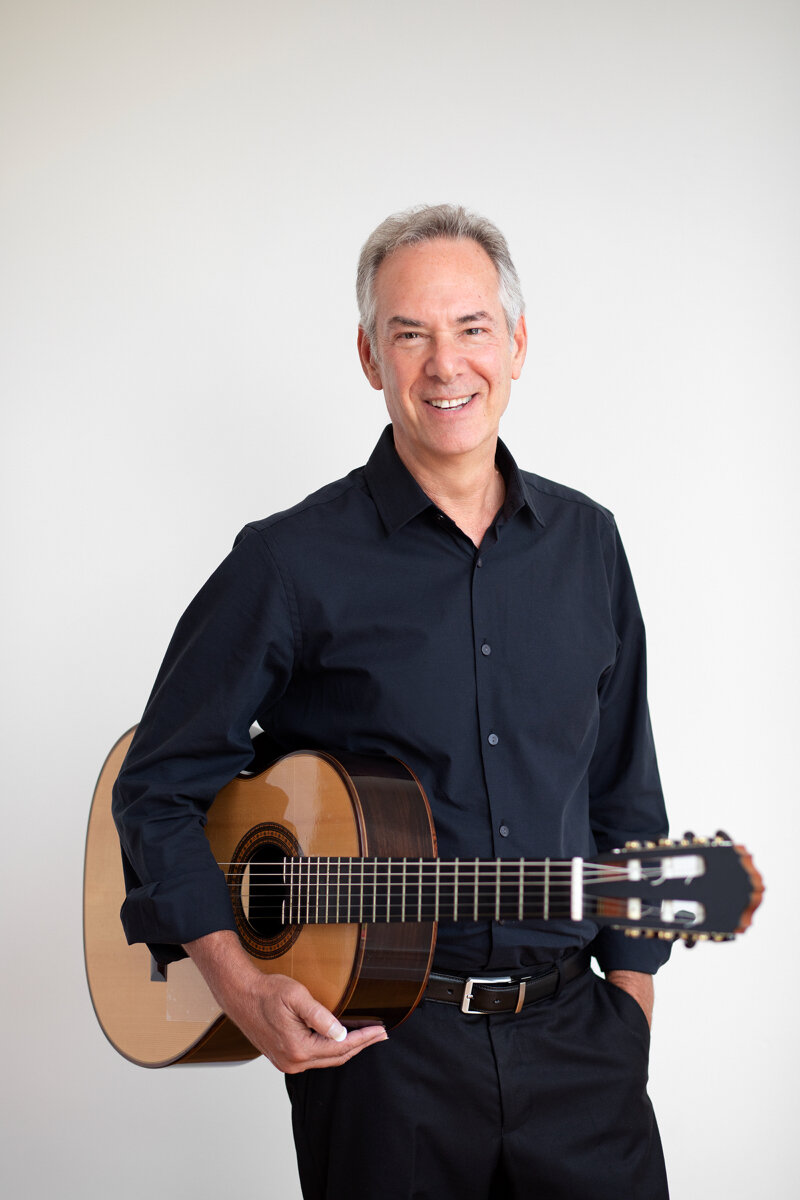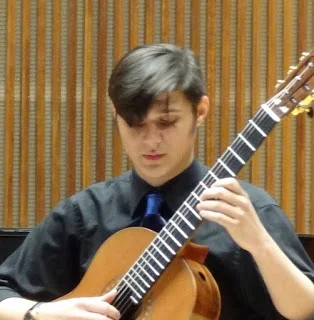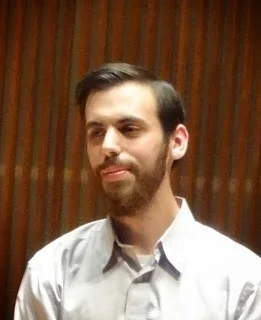Thanks to the generosity of my old friend, James Stroud (University of Akron MM, 1985), we have a new annual scholarship for Oberlin students. We've dubbed it the "Stroud Classical Guitar Entrepreneurship Scholarship"; this spring will be its inaugural season.
As many of you already know, Jim funds and co-runs, with me, an annual performance competition for classical guitar students in the state of Ohio. We host the event at Oberlin Conservatory. (This year, the event takes place March 13-14, with guest artists Jeffrey McFadden and Randall Avers). In addition to this opportunity, he wanted to present something special to my studio and so has offered to give $5,000/year towards this new scholarship.
My thinking in developing this type of scholarship goes like this:
There are numerous opportunities for young musicians to hone and test their prowess as players, from the student's semesterly hearings and juries, to recitals, auditions and competitions such as the one described above and the burgeoning field of similar events across the country. I thought this area of our expertise hardly needs further examined. Further, in a relatively small studio such as mine at the Conservatory (10-12, all undergraduates), it is common for a small number of students to rise to the top at any given time and dominate these opportunities, leaving others in the position of observers.
The entrepreneurship scholarship, on the other hand, celebrates all the other things we do in our chosen field in an effort to achieve success and pursue our unique paths. These other things might be related to playing, certainly, such as taking a recital program out into the public arena, but might also be nonperformance-oriented, such as writing grants or composing original music, or cultivating a teaching studio. I offered the studio a list of possible activities which might qualify for consideration, at the beginning of the year. In April, I will assess the student's success at becoming "guitar entrepreneurs" and make the cash awards in whatever distribution pattern seems to best describe the candidate's newly burnished resumés.
Here is the list that was offered:
As many of you already know, Jim funds and co-runs, with me, an annual performance competition for classical guitar students in the state of Ohio. We host the event at Oberlin Conservatory. (This year, the event takes place March 13-14, with guest artists Jeffrey McFadden and Randall Avers). In addition to this opportunity, he wanted to present something special to my studio and so has offered to give $5,000/year towards this new scholarship.
My thinking in developing this type of scholarship goes like this:
There are numerous opportunities for young musicians to hone and test their prowess as players, from the student's semesterly hearings and juries, to recitals, auditions and competitions such as the one described above and the burgeoning field of similar events across the country. I thought this area of our expertise hardly needs further examined. Further, in a relatively small studio such as mine at the Conservatory (10-12, all undergraduates), it is common for a small number of students to rise to the top at any given time and dominate these opportunities, leaving others in the position of observers.
The entrepreneurship scholarship, on the other hand, celebrates all the other things we do in our chosen field in an effort to achieve success and pursue our unique paths. These other things might be related to playing, certainly, such as taking a recital program out into the public arena, but might also be nonperformance-oriented, such as writing grants or composing original music, or cultivating a teaching studio. I offered the studio a list of possible activities which might qualify for consideration, at the beginning of the year. In April, I will assess the student's success at becoming "guitar entrepreneurs" and make the cash awards in whatever distribution pattern seems to best describe the candidate's newly burnished resumés.
Here is the list that was offered:
PERFORMANCE
Performances: solo
recitals (over and above required recitals)
---In community (Kendall, local churches etc.; print and keep programs)
---On-road touring
(book external shows and then play them; print and keep programs)
Competing
---Enter
regional/national competitions (you don’t have to win for this to count)
Collaborative
performance
---Chamber music
(over and above Guitar Ensemble)
---Form a regular
duo or ensemble, work-up rep and perform
---Contemporary Music
Ensemble
---Early music/continuo playing
---Early music/continuo playing
---Music theatre/opera productions
---Dance concerts
---Straight theatre/Poetry readings- incidental music
---Etc.
Gigs (guitar as
incidental music) [possible $]
---Pit orchestra—Oberlin College or local theatre productions
---Join union for professional orchestra and other on-call gigs
---Weddings
---Parties/functions
---Restaurants
---Etc.
Informances in area
public/private schools (talk to Mus. Ed. Faculty for guidance)
Work with student
composers (and play “world premieres” of their works)
Play/Study Secondary styles/instruments
---Flamenco
---Choro
---Renaissance lute
---Renaissance guitar
---Renaissance guitar
---Baroque lute
---Baroque guitar
---Electric gtr in
new music
---Ukulele
---Banjo
---Finger style steel string guitar
---Finger style steel string guitar
---National Steel
guitar
---Pedal steel guitar
---Pedal steel guitar
---Etc.
Form your own or
join a non-classical ensemble such as a
---Rock band
---Folk music band
---Singer-songwriter
ensemble
---Tango band
---Bluegrass band
---Jazz combo
---Etc.
RECORDING
Record a CD
---Record your
recital after it is over, for real, in studio, with editing, and see the
project through, including design, liner
notes and manufacturing
Learn art of audio
editing, and edit recordings of others as well as your own
Learn art of audio
mastering, and master recordings of others as well as your own
Practice
video-recording yourself, trying different set-ups--lighting, locations, etc.
YouTube: upload
your performance vids and create your own channel
Record audio or
video interviews of others and submit to suitable websites or upload to your
own YouTube channel
TEACHING
Teaching Private
Lessons
---Take Oberlin
secondary students as invited and available
---Find employment
at local music stores/community music schools
---Take private
students
---Sign up for
Suzuki Teacher Training when available
Teaching Master
Classes
---Offer to teach
master classes for your colleague’s studios (yes!)
Teaching Classes
(what subject can YOU teach?)
---Winter Term ExCo
EDUCATION
Participate as
performer in external master classes (over and above our Oberlin guests)
Participate as
auditor in external master classes (over and above our Oberlin guests)
Take spot
lessons/coachings with other teachers
WRITING
Write your own
original compositions – must be fully notated and performed
Write your own
original arrangements – must be fully notated and performed
Write (Prose) for
publications (on guitar/music): submit articles to periodicals, online zines,
etc.
Blog: start your
own (guitar/music-related)
TECHNOLOGY
Website
---Create and
curate your own site, complete with photos, bio, videos, sample programs, CV, contact
info, links, etc.
Podcast
---Start your own (guitar/music-related)--people may be interested in what you have to say
Coding
---Design and code
your own guitar/music/education-related app: launch a start-up (tech geeks!)
ADMINISTRATIVE
Participate as an
officer in the Oberlin Guitar Club
Join Con Council or other campus organizations and offer to be an officer
Join Con Council or other campus organizations and offer to be an officer
Present your own guest
artists
---Host a colleague
for a concert
---Create, direct and host your own
full-scale event (workshop, symposium, competition, master class, etc.)
Volunteer for Arts
Organizations, help run events
---Cleveland
Classical Guitar Society
---STRING Festival,
Massillon
---Etc.
GRANTS
Apply for external
funding for special projects (winning a grant is a big deal)
OTHER
Radio
---Start an
on-campus weekly radio program dedicated to classical guitar and host it
Attend external
guitar events
---Go to area concerts,
festivals, workshops, master classes (keep programs)
Build and repair instruments;
apprentice with a luthier
Work in a music
store; discover the world of music retail
MORE?........
-------------------------------
As my students have moved forward this year, its been obvious many of them have taken this entrepreneurship challenge seriously. There is a whole range of activity happening that most likely would not have had this award not been on the table. I don't know who will win scholarships this coming semester and who won't, but one thing is clear: every student who embarks on a project on this list is broadening his/her professional base and increasing his/her range of experience. I feel gratified that students who have difficulty rising to the top in performance competitions have another opportunity to become winners. And I know, without question, that the students are clear on this simple fact: it takes more to succeed in the world than simply being good at the instrument. They must cultivate additional, related skills and experiences and in doing so, open up new vistas for professional activity. As Oberlin alum Matthew Hinsley (BM, 1996) put it during a talk he gave with my students on a return visit: they need to develop the largest footprint in the industry possible.
I wish them all well as they prepare their submissions later this semester, in hopes of winning one of the Stroud Entrepreneurship Scholarships. In the end, if they try, scholarship or not, they'll all end up winners.




